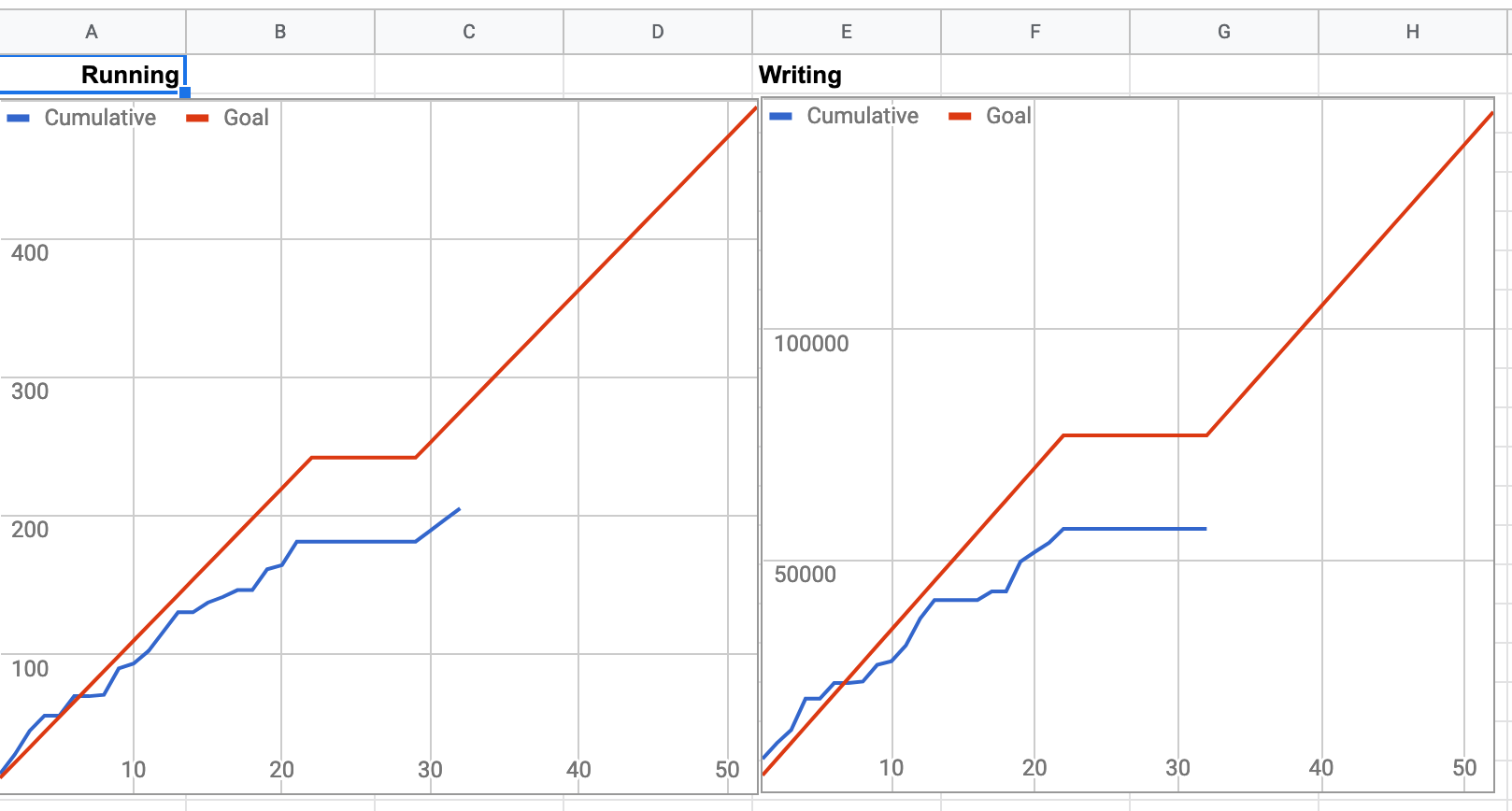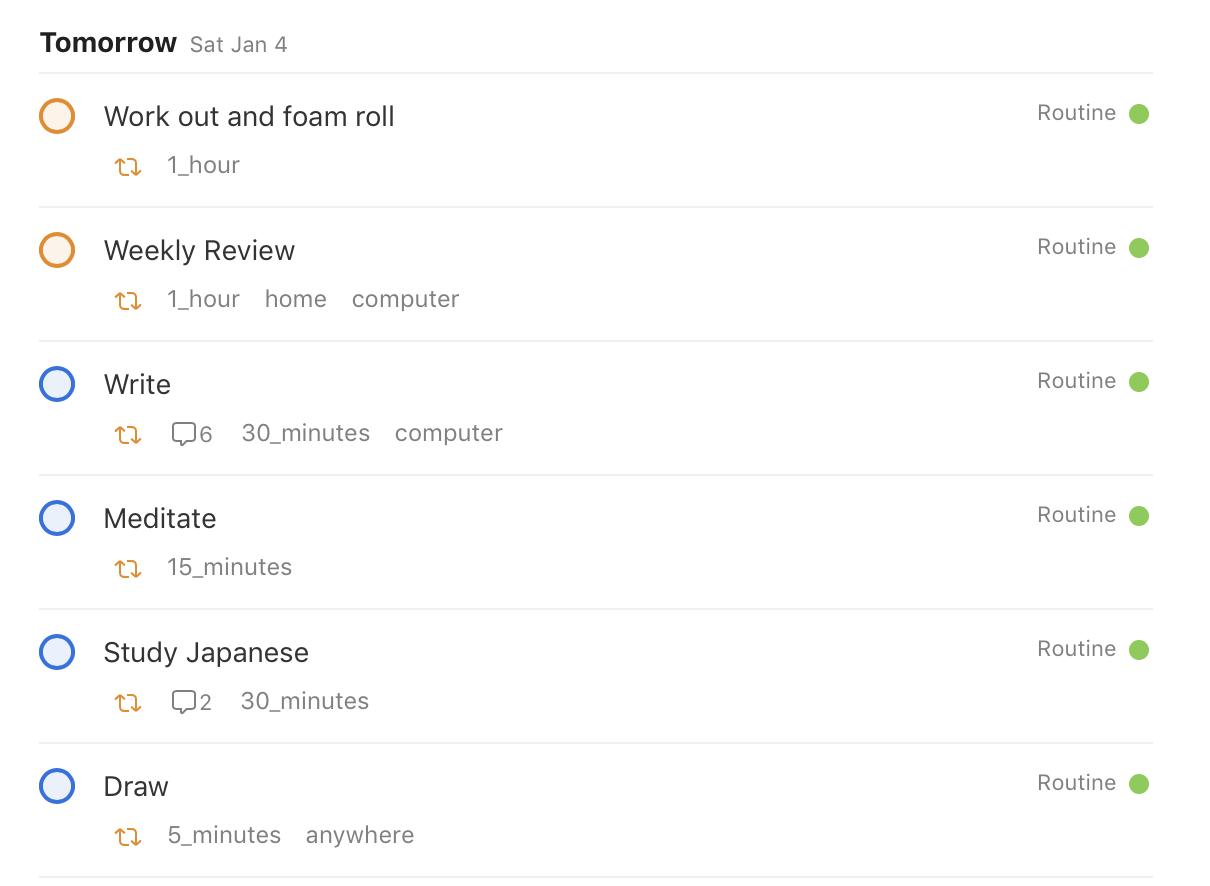Do better, not best - transitioning to a growth mindset
Summary: On how setting goals like 'run a marathon' or 'write 1000 words per day' hurt me more than helped, and what I'm doing now instead. (1206 words/6 minutes)
In 2019, I had a few mindset shifts around recurring, daily or near-daily work.
In short: Frequency first. Duration next. Then, quality. Make progress every day. Any progress counts, duration + quality should go unmeasured.
Old goal: Run a marathon in 2019. New goal: Run every day.
Old goal: Write 1000 words every day. New goal: Write every day.

Yikes.
In the past, I was very focused on big-picture goals which had very specific targets. Make $X/year in my freelancing business, run this many miles, write this many words. I even had burndown charts.
This approach never lasted more than a month or so. I would inevitably stumble, and be so far behind my goal, or so far off the "streak", that I saw no point in getting back on. Better wait until next year, I guess.
Unfortunately, you will inevitably stumble temporarily on the way to any progress on anything. When running, you will get injured. When writing, you will inevitably want a day off. With money, sometimes things change in the economy that you have no control over.
My old approach led to me burning the house down every time I hit a speedbump.
In 2019, though, things started to change.
I only realized what was happening in retrospect. When I was compiling my list of content I produced for Speedshop in 2019, I realized I had produced 41 pieces of content in 2020. Most of those were 500 to 1000 word email newsletters, but also 3 3000-word blog articles and 2 45 minute conference talks. That's a fair amount of creative output by anyone's measure, and it's far more than I've ever done.
What changed?
Frequency first, and no more long-term goals.
My todo-list now looks something like this, every day:

Note that I cannot track (at least not obviously) how many days in a row I have done any particular task. Notice how there are no specific goals: write X words, meditate X amount, practice Japanese for X minutes, either or a daily or monthly or other time basis. I've got some labels there to help me budget my time for the day, but they're not mandatory. There are no requirements for the duration of each task or the quality of the execution.
I give myself permission to check the boxes off on these tasks even if I only work on it for 10 seconds. Meditated for 2 minutes and barely paid attention? Check the box. Wrote 10 words? Check the box. As long as I sat down and made an honest attempt, check the box.
After adopting this approach, what happened next was kind of weird.
By not focusing on duration and quality of my work, both of those things started to improve. By focusing on frequency instead, and giving myself permission to fail, I succeeded more on all of these goals than I have for 10 years of trying.
One habit I've really built over the last year has been writing. I just try to write something, every day. I vaguely want to write for about 30 minutes or 500 words, but I give myself permission to "check the box" on my to-do-list even if I just write for 5 minutes. Just by sitting down and starting to write, I usually find that after a few minutes, the words start to flow and then 25 minutes later I've got 500 words.
Critically, I'm not tracking how many email newsletters I send or blog posts I write. I vaguely would like to release one of either each week, but I don't track this anywhere. I'm only aware of whether or not I did it this/last week or not. If I did it last week, great. Let's do it again this week. If not, OK, try again better this week. No more year-long targets that I can fall behind on.
Better, not best
The struggle of daily work, I've realized, is not its quality, but its frequency. Try to do something every day, and the quality takes care of itself. Focusing on quality only leads to stress when quality is inevitably not achieved.
With frequency of execution inevitably comes quality. If you do something every day, with attention and effort, you will get better at it. So why set goals for the quality of your output, when it will actually take care of itself?
Ira Glass has spoken about the chasm between being a critic or dillettante and becoming a creator. You start with good taste and no skill of creation, and so when you start to build your creative skills, there is inevitably a "dip" where you can tell your own work is bad, because that is all you are capable of producing. There is only one solution: stop critiquing. Stop paying attention to the quality of your output. Relegate it to the back burner. You'll come back to it. For now, you must simply do the work.
Make failure temporary
The problem with "streak" strategies and long-term goals (write X words per week or year) was that they had a way of making failure permanent. For example, in 2017, I wanted to write 1000 words per day (or 365000 words per year), and I realized around March that I would never reach my goal, so I quit. I stopped writing. My goal was now impossible, so I failed, permanently.
My new approach wipes the slate clean every morning. I am not aware of any streaks or long-term goals, so the worst possible failure I can have is that I didn't have a good day. But the next morning, that no longer figures into my thinking. I'm just trying to "win the day", every day, which means that failure, while possible, is only temporary.
No rest days
In the past, I've set complex and detailed goals about how much I want to lift, to run, to bike, whatever. Now, I do none of that. I just work out every day. No rest days. Some days I go in and just spin the wheels very lightly for 30 minutes, but I just let my body tell me what to do.
Doing something every day means that doing it is not a decision. It's just something you do. I no longer have to decide if I'm going to the gym every day. I just go, every day, at the same time. Once I'm actually at the gym, I give myself permission to do whatever I want. If I want to sit in the gym cafe for 90 minutes, fine. I've never done that, but I could, if I wanted to. But, inevitably, once you're through the door, you start working out. Might as well, right?
Of course, there are some physical limits. I don't weight train every day, I do weights only 3 days a week. I do cardio (usually Peloton) every day, but 2-3 days a week are very light, sometimes just 20 minutes. But I go to the gym and do something every day, and the going is the hard part, as anyone who's tried to build a physical fitness habit knows.
Growth over results
Overall, this is part of a new focus I gained in 2019 of focusing on growth (relative progress) over results (absolute progress). If I'm getting better (or maintaining a difficult, creative effort), I'm happy. I don't measure myself against others or even my own made-up targets (e.g "I want to make $X this year"). I just want to get better.
Better is a more productive mantra than best because better admits the possibility of failure. Better allows a circuitous, bumpy path to success, whereas best only allows perfection.
I hope that in 2020 I'll continue along this path. There will inevitably be bumps, small failures in the road - but I'll be better than I was today.
Want a faster website?
I'm Nate Berkopec (@nateberkopec). I write online about web performance from a full-stack developer's perspective. I primarily write about frontend performance and Ruby backends. If you liked this article and want to hear about the next one, click below. I don't spam - you'll receive about 1 email per week. It's all low-key, straight from me.
Now Available: The Complete Guide to Rails Performance
I've authored an in-depth course for making Ruby and Rails applications faster. The Complete Guide to Rails Performance is a full-stack course that gives you the tools to make Ruby on Rails applications faster, more scalable, and simpler to maintain. It includes a 361 page PDF and over 15 hours of video content.
Learn more at railsspeed.com.